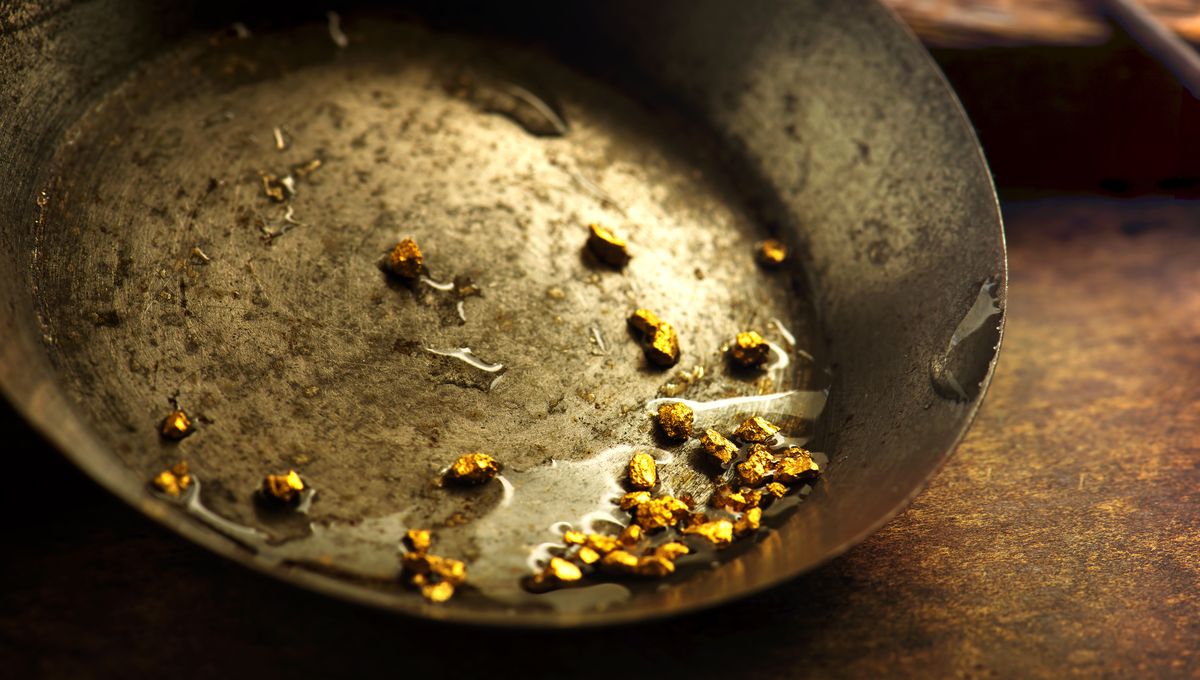
Planet Earth’s oceans hold a mindblowing quantity of gold, enough to satisfy the greed of Smaug many, many times over.
Scientists have estimated that there’s around one gram of gold dissolved in every 100 million metric tons of seawater in the Atlantic and North Pacific. In other parts of the world, such as the Mediterranean Sea, gold is likely to be at marginally higher concentrations.
The gold arrives in the oceans through a variety of channels. Much of it begins on land: rocks containing trace amounts of gold slowly break off under the assault of rain, rivers, and weather. Bit by bit, dissolved gold is carried to the sea. Even the wind lends a hand, sweeping literal bits of “gold dust” from dry land into the water.
The seafloor provides another source. Along the seafloor, especially regions where tectonic plates meet, hydrothermal vents blast out superheated fluids loaded with dissolved minerals. Gold is a small but significant part of this underwater cocktail, mixing into the ocean currents.
The concentration of gold in seawater is extremely diluted. A liter of seawater is estimated to contain just femtomoles, which is a bit like a needle in a stadium full of haystacks.
Nevertheless, since there is so much seawater on planet Earth, it does add up. An older estimate by the National Oceanic and Atmospheric Administration said there are approximately 20 million tons of gold in the planet’s seawater. These are very rough estimates, but let’s roll with it for a moment.
The price of gold is constantly changing, plus it’s hard to find a concrete value of such a large weight, but an estimate from September 2025 says that 1 ton of gold could be worth $106,322,708.
Going by that valuation, the gold in the world’s seas would be worth approximately $2,126,454,160,000,000 – that’s about $2.13 quadrillion.
Unfortunately, if you’re thinking of heading to the beach in a hasty get-rich-quick scheme, you might be in for a challenge.
Extracting gold from seawater is very tricky and there’s currently no cost-effective way to mine gold from the ocean to make a profit. A 1941 study published in the journal Nature described an “electrochemical method” to extract gold from seawater. However, the cost of the process turned out to be five times more expensive than the value of the gold obtained.
In more recent times, a 2018 study in the Journal of the American Chemical Society described a material that acted like a “sponge” to quickly extract trace amounts of gold from seawater, as well as freshwater and even sewage sludge.
It was reportedly able to suck up 934 milligrams of decent quality gold in just two minutes. Once again, however, scaling this up to a point where it is actually profitable is extremely tricky. For now, the technology is only being developed as a way to recover the trace amounts of gold lost during production.
For now, the ocean remains a glittering piggy bank no one can crack – and your next trip to the beach definitely won’t pay for itself. If you are on the hunt for astronomical amounts of precious metals, you are better off looking to the skies than our own oceans. Once the realm of science fiction, asteroid mining is poised to be one of the next big things in space exploration.
In fact, asteroids are so packed with metals that even the Moon’s craters are thought to be sprinkled with billions upon billions of dollars’ worth of platinum and other valuables from ancient collisions.
An earlier version of this article was published in May 2023.
Source Link: Millions Of Tons Of Gold Are In Earth's Oceans, Potentially Worth Over $2 Quadrillion